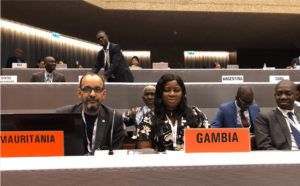Fatoumata Komma is a Program Officer with the Non-Communicable Disease (NCD) prevention and Tobacco Control Unit at the Gambia Ministry of Health and Social Welfare (MoHSW). She holds a Bachelor’s of Science degree in Public and Environmental Health from the University of the Gambia. Since 2010, Fatoumata has served as a Public Health Officer with the MoHSW where she has supported various initiatives including the strengthening and improvement of routine immunization, disease surveillance, prevention and control of diseases and outbreaks. In her current role as Program Officer, she coordinates, leads the implementation and oversees the monitoring and evaluation of all non-communicable disease prevention and control activities in the Gambia. Furthermore, she spearheads the formulation of national health policies for the ministry.
What are you most proud of?
Tobacco smoking is the most significant risk factor for non-communicable diseases (NCDs). Most of my work, as a Program Officer, involves raising awareness on the risk factors of NCDs and the need for communities to engage in healthy behaviors. As a staff of the MoHSW working under the NCD unit, I am most proud of being one of the pioneers for the drafting and finalization of the National Tobacco Control Bill, which was passed into parliament and enacted in December 2016.
The Gambia Tobacco Control Act 2016, as it is called, is one of the strongest tobacco laws on the African continent, and The Gambia has been commended for it on many international fora. In fact, this law, which seeks to reduce the demand and supply of tobacco products, has been used as a reference by many other African countries. It advocates for a 100% smoke free environment, with provisions on restrictions on sale of tobacco products to minors, regulating the contents and labeling of tobacco products brought into the country, to name a few.
Which one thing do you wish you’d done differently?
Our office has been fortunate enough to win a grant from the World Diabetic Foundation (WDF) in Denmark. The project seeks to raise awareness on diabetes and hypertension, build the capacity of health care providers on the prevention and management of diabetes and hypertension, and work with communities to adopt healthy lifestyles such as engaging in physical activity. When the project began, it was well appreciated and embraced by the MoH and communities. However, as the initiative progressed, I realized that patients suffering from diabetes and hypertension, who reported to health facilities for treatment, were not receiving the drugs they needed. It turns out that drug coverage had not been catered for in the submitted project proposal. This has ended up reducing the zeal of patients to go for regular check ups. Many of these patients report feeling that there is no use for the regular check-ups given that they are only screened and not provided with medications for treatment. In hindsight, for this project, I wished that the proposal had been drafted differently to ensure a holistic approach for the treatment and management of these conditions – whereby patients will both be screened and given drugs. Moving forward, I intend to assure that treatment is given due importance in the next phase of the project application.
 What are some of the biggest challenges you have faced? How did you overcome them? What are some of the lessons learnt?
What are some of the biggest challenges you have faced? How did you overcome them? What are some of the lessons learnt?
One of the biggest challenges I have faced with executing my role in the prevention and control of non-communicable diseases in my country is the lack of sufficient funding. Looking at the menace caused by NCDs, the government still has not invested adequate resources into the prevention and control of these diseases. While I have developed effective and low cost interventions and strategies to address some of the most pressing NCD needs, funding remains a challenge and obstacle for implementation.
To overcome this funding challenge, I knocked on the doors of donors, both within the country and internationally, who have agreed to partner with the MoH. Currently, we have the World Diabetic Foundation project which has generated a great demand for NCD services across all health facilities within the country.
People are now more willing to engage in regular screening to know their blood pressure and blood glucose levels. The key lesson I learnt is that once you develop passion for a cause, obstacles won’t make you stand back and watch things fall apart; instead they give you the courage to take initiative and engage in innovative approaches to solve the problem.
What are some of the opportunities you see for women in health on the African continent?
As a health worker, I have pursued numerous opportunities in the field of health. Mostly, we see fewer women come into the health and STEM fields due to the belief that it is difficult and demanding. Nonetheless, a lot of opportunities for women lie ahead, which include capacity building and networking with experienced professionals. Personally, I have had the opportunity to gain international exposure, build rapport with seasoned and experienced professionals from whom I have gained knowledge and skills to excel and contribute towards furthering the impact of my job.
What advice do you have for other women in health?
My advice for women in health is to be proactive. We should be willing to go the extra mile to ensure that people see the change that we want and advocate for. In addition, we should strive to be at the forefront of any health intervention plan. As women, we must not underestimate the influential roles we hold in our societies and communities. There is a lot we can contribute towards positive change, particularly with advocating for healthy behaviors, if we take on active roles with the planning and implementation of health intervention plans.


Leave a Reply